Episodes

Wednesday Dec 31, 2025
Wednesday Dec 31, 2025
Grady Page joins me for a philosophy salon on how accelerationist ideas influence contemporary struggles over technology, capitalism & the left. Read this Substack about the event: https://revolpress.substack.com/cp/180530252
If you benefit from my work please consider a donation: paypal.me/danieltutt1 You can also become a Patron to gain early access to all of my interviews and videos: www.patreon.com/emancipations

Wednesday Dec 24, 2025
Wednesday Dec 24, 2025
I'm joined by Tony Chamas, aka "Tony of @1Dimee" for a discussion on the philosopher Jean-Claude Michéa's theory of liberalism. Liberalism requires a unity between its economic and its cultural imperatives in order to remain intact as a ruling political ideology. What role does the left play in keeping this unity intact? We will argue that when the left becomes the stewards of cultural liberalism they participate in the pacification of class struggle politics and this prevents the left from remaining true to a socialist vision of politics. We discuss and debate how to best address this fundamental double bind, how it might be overcome and what the prospects are for socialist politics once this hostage situation is undone.
Tony Chamas is a political theorist and author of the forthcoming book "Freedom to Change Nothing: The Spectrum of Managed Democracy and What Makes the US Different." Chamas is also a video essayist known for his YouTube channel, 1Dime and his podcast, 1Dime Radio. His most notable videos include "The Deficit Myth" and "China's Cultural Revolution: The Full Story" (Documentary).

Wednesday Dec 17, 2025
Wednesday Dec 17, 2025
I am joined by Lacanian philosophers Nadia Bou Ali and Surti Singh to discuss the concept of "Extimacy" in the work of Jacques Lacan. In 1960, Lacan coined the neologism extimité (extimacy) to denote a structure of subjectivity in which the most intimate, internal core is already external, thus complicating the traditional philosophical dualisms and binaries that have informed traditional notions of subjectivity. We discuss what this idea helps us to think in terms of philosophy, culture and politics. This conversation is based on a new collection of essays co-edited by Nadia and Surti entitled Extimacy, a book that is the first sustained interrogation of the concept.
Nadia Bou Ali is an associate professor and director of the Critical Humanities Program for the Liberal Arts at the American University of Beirut. She is the coeditor of Lacan contra Foucault: Subjectivity, Sex, and Politics and the author of Hall of Mirrors: Psychoanalysis and the Love of Arabic. Bou Ali is a candidate analyst at the Lacanian School of Psychoanalysis in the Bay Area.
Surti Singh is an associate professor of philosophy at Villanova University.

Monday Dec 15, 2025
Monday Dec 15, 2025
I've have hosted a number of interviews, symposiums, lectures and study groups this year. This is a Q & A session where I answer questions from patrons, listeners and supporters. If you benefit from my work please consider a donation to help defray the costs of organizing all of these events: paypal.me/danieltutt1 You can also become a Patron to gain early access to all of my interviews and videos: https://www.patreon.com/c/emancipations

Monday Dec 08, 2025
Monday Dec 08, 2025
In our latest episode of The Archimedean Point, we turn to Edward Said's theory of Orientalism and address its shortcomings from a Marxist perspective. We focus on Disney's Aladdin from the early 1990s as an example of pop-Orientalism, and we argue that Aladdin offers an allegory for the remaking of Middle Eastern society by capitalism.
--
If you benefit from my work please consider a donation: paypal.me/danieltutt1
You can also become a Patron to gain early access to all of my interviews and videos: www.patreon.com/emancipations

Monday Dec 08, 2025
Monday Dec 08, 2025
We are joined by philosopher Cadell Last, the host of Philosophy Portal to discuss his new article "No Marxism Without Žižek", (https://bit.ly/46c4gnj) a review of Flowers for Marx.

Thursday Dec 04, 2025
Thursday Dec 04, 2025
I am joined by philosopher Alex Taek-Gwang Lee for a critical analysis and discussion on the legacy of Gilles Deleuze's thought, its influence on the existing left and the ways that the concepts Deleuze developed have interacted with the wider Marxist tradition. This conversation will consider Dr. Lee's recent book Communism After Deleuze, published with Bloomsbury https://www.bloomsbury.com/us/communism-after-deleuze-9781350474048.
Please support me on Patreon https://www.patreon.com/c/emancipations

Thursday Dec 04, 2025
Thursday Dec 04, 2025
My guest is Ross Wolfe, a socialist historian and writer. In a recently published three-part essay entitled, "Against Losurdo" (https://newintermag.com/against-losurdo) Wolfe argues that Losurdo's work represents the re-introduction of Stalinism in contemporary Marxism. We discuss and debate Losurdo's work, with a focus on his book Western Marxism and his works on Hegel and Nietzsche.
To watch the study sessions we hosted on Losurdo's Western Marxism, please go here: https://youtube.com/playlist?list=PLE03jn2k3GYCRd7dnBOAKBN-H-F-wGzYa&si=zkRb8GeYoi_Nc2Gv
Support my work on Patreon by becoming a paid member: https://www.patreon.com/c/emancipations

Wednesday Nov 19, 2025
Wednesday Nov 19, 2025
I am joined by political theorist Benjamin Studebaker to discuss the retreat of the political and the concomitant rise in despair. How do we theorize this despair, and how does it differ from spiritual despair?
Please read Studebaker's article which is the focus of this discussion: "Political Despair and Moral Injunctions" https://bit.ly/469EqkQ

Wednesday Nov 19, 2025
Wednesday Nov 19, 2025
My guest is Michael C. Behrent, a historian of French intellectual history and a leading scholar of Michel Foucault. Behrent has been at the forefront of an important debate about the legacy of Foucault's thought, and specifically his political influence on the contemporary left and the rise of neoliberalism. Behrent is also working on the thought of Michel Clouscard, the most important French Marxist from the 20th century you have likely never heard about. The second half of this conversation is a discussion on Clouscard's work, his critique of the wider ecosystem of French philosophy from the 60s and 70s and specifically his analysis of the ideology of "liberal libertarianism."
Michael C. Behrent is a professor of History at Appalachian State University. His scholarship has sought to historicize the work of the French philosopher Michel Foucault. This work evaluates the political significance of Foucault's reflections on free-market economics by situating his work in the shifting ideological landscape of France in the 1970s. And his current project seeks to show how Foucault’s thought was (to a significant degree) rooted in his upbringing in Poitiers, France from the 1920s to the 1940s. Behrent is also developing a project that seeks to reconstruct the thought of the “young Foucault” (spanning 1949 through to the mid-1960s). Behrent also writes about American politics and culture for several French publications, notably Esprit as well as Dissent, Foreign Policy, and Oxford University Press blog.
Read his article on Michel Clouscard here, "Michel Clouscard vs. the Hipster Left" https://bit.ly/3Kn6jO0

Wednesday Nov 19, 2025
Wednesday Nov 19, 2025
I am joined by philosopher and scholar Zahi Zalloua to discuss the politics of resentment, and how to theorize the problematic concept of "ressentiment" and whether this concept can be applied to emancipatory ends. Is ressentiment a political affect that can be harnessed for revolutionary action? We discuss Zalloua's recent works: Fanon, Žižek, and Violence of Resistance and The Politics of the Wretched: Race, Reason, and Ressentiment.
Zahi Zalloua is Cushing Eells Professor of Philosophy and Literature and a professor of Indigeneity, Race, and Ethnicity Studies at Whitman College and Editor of The Comparatist. His most recent work includes Fanon, Žižek, and Violence of Resistance (2025), The Politics of the Wretched: Race, Reason, and Ressentiment (2024), Solidarity and the Palestinian Cause: Indigeneity, Blackness, and the Promise of Universality (2023), Being Posthuman: Ontologies of the Future (2021), Žižek on Race: Toward an Anti-Racist Future (2020), Theory’s Autoimmunity: Skepticism, Literature, and Philosophy (2018), and Continental Philosophy and the Palestinian Question: Beyond the Jew and the Greek (2017).

Wednesday Nov 19, 2025
Wednesday Nov 19, 2025
My guest is the political economist Adam Hanieh, a foremost expert on the political economy of the Middle East, fossil capitalism and imperialism. We discuss the war on Gaza, the prospects of Palestinian statehood, the dominance of Gulf oil and how it shapes the ruling classes in the region and the status of labor struggles across the wider Middle East.
Professor Adam Hanieh is the author of six books including the most recent Resisting Erasure: Capital, Imperialism and Race in Palestine with co-authors Robert Knox and Rafeef Ziadah as well as Crude Capitalism: Oil, Corporate Power, and the Making of the World Market and Money, Markets, and Monarchies: The Gulf Cooperation Council and thePolitical Economy of the Contemporary Middle East which was awarded the 2019 British International Studies Association International Political Economy Group Book Prize.
Please support us on Patreon https://www.patreon.com/c/emancipations

Monday Sep 22, 2025
Monday Sep 22, 2025
I am joined by Alan M. Wald to discuss his extensive work on the literary left and the history of intellectuals and the communist movement in America. We discuss Wald's new book of essays called "Bohemian Bolsheviks: Dispatches from the Culture and History of the Left" which features a number of Wald's more recent essays and interventions on the history of US communism, including essays that touch on Richard Wright, James T. Farrell, Mike Gold, Agnes Smedley, John Steinbeck, Lorraine Hansberry and many other writers who incorporated a commitment to the class struggle in their writing, and who were influential propagating socialist and communist ideals.
In this interview, we discuss the meaning of "realism" and why it is important to socialist writers, the founding of the communist party of America, the role of Trotskyism on US left intellectuals, the role of Browderism on the cultural development of the communist party in America, the legacy of The Romance of American Communism by Vivian Gornick, Wald's methodology as a researcher and writer, African American literature, the New Left and various individual authors.
Alan Maynard Wald is an American professor emeritus of English Literature and American Culture at the University of Michigan, Ann Arbor, and writer of 20th-century American literature who focuses on Communist writers; he is an expert on the American 20th-Century "Literary Left." Wald's subjects have included: 20th Century United States Literature; Realism, Naturalism, Modernism in Mid-20th Century U.S. Literature; Literary Radicalism in the United States; Marxism and U.S. Cultural Studies; African American Writers on the Left; Modernist Poetry and the Left; the 1930s (Literature); New York Jewish Writers and Intellectuals; 20th-Century History of Socialist, Communist, Trotskyist and New Left Movements in the U.S.; the 1960s Politics and Culture; Cold War Culture and Resistance; Old Left/New Left in U.S. Politics and Culture; and Film Noir and the Left.
Please join our Patreon to get early access to all interviews and to participate in our study groups https://www.patreon.com/c/emancipations

Monday Sep 22, 2025
Monday Sep 22, 2025
My guest is art historian and Marxist thinker Angela Harutyunyan, who has joined us to discus the work of the Marxist philosopher Mikhail Lifshits. Lifshits was an important Soviet Marxist thinker who developed a theory of aesthetics that remained committed to the proposition that communism entails the overcoming of alienation. Lifshits offers a critique of modernism and theories on classicism and socialist realism that are deeply relevant to today's time. We discuss Lifshits's major works, key concepts and his wider philosophy of art and aesthetics. We also discuss an important debate on the concept of the ideal that occurred between Lifshits and Soviet Marxist Evald Ilyenkov.
Dr. Angela Harutyunyan is a founding editor of ARTMargins published by MIT Press and has published extensively on post-Soviet art, Marxist aesthetics, and curatorial theory. She is the author of "The Political Aesthetics of the Armenian Avant-garde: The Journey of the \'Painterly Real\'" and co-author of "After Revolution: Historical Presentism and the Political Eclipse of Postmodernity". Harutyunyan has taught at the American University of Beirut and the American University in Cairo. She is currently based at the Universität der Künste Berlin.
Please join our Patreon to support our efforts https://www.patreon.com/c/emancipations

Thursday Jul 31, 2025
Thursday Jul 31, 2025
C. Derick Varn, host of the Varn Vlog is a Marxist theorist, poet and political commentator. Varn joins our show to discuss the protests and riots against ICE in Los Angeles and across the country that popped off in late spring and early summer 2025. We examine the history of riots in the US, the role of the left in the context of a second Trump presidency, how Marxists have theorized the return of riots and uprisings in our time (with a focus on communization theory) and what we might expect moving forward.
Please support our work by becoming a Patreon member https://www.patreon.com/c/emancipations

Wednesday Jul 23, 2025
Wednesday Jul 23, 2025
Analytic philosophy is the leading form of philosophy in the English-speaking world and most academic philosophy departments are analytic. But what explains this power and what is the history of analytic philosophy. Where did it begin and how did it rise to such prominence? I am joined by philosopher Christoph Schuringa to explore the social history of analytic philosophy.
Analytic philosophy tends to think of itself as concerned with eternal questions, transcending the changing scenes of history. It thinks of itself as apolitical. This book, however, convincingly shows that the opposite is true. To this day, analytic philosophy is the ideology of the status quo. It may seem arcane and largely removed from the real world, but it is a crucial component in upholding liberalism, through its central role in elite educational institutions. Learn more about this book and acquire a copy here: https://bit.ly/4lhoHF5
SHOWNOTES:
We discuss why Christoph wrote the book, the origin of the analytic/continental divide, the meaning of logical positivism, Wittgenstein's influence and the various schools in Cambridge and Vienna that formed analytic philosophy.
The contradictions of the "linguistic turn" and the ways it failed to address social concerns.
Whether there are exceptions within analytic philosophy, or philosophers whose methods might offer a more robust engagement with the social and with radical philosophy.
The theory of the "colonization" of analytic philosophy in other disciplines, from ethics, to politics, to continental thinkers.
Can analytic philosophy shake off liberalism and if not why. If so, how?
#EmancipationsPodcast

Tuesday Jul 22, 2025
Tuesday Jul 22, 2025
My guest is Dr. Francesca Antonini, a historian and scholar of Antonio Gramsci. Dr. Antonini teaches at the Ca' Foscari University in Venice Italy. Her latest book is an exhaustive study of Gramsci's theory of Bonapartism, and it is entitled, Caesarism and Bonapartism in Gramsci: Hegemony and the Crisis of Modernity. In this discussion, we examine the Marxist view of Bonapartism and how it differs from liberal theories, the different periods of Gramsci's thinking on the concept, how Bonapartism relates to fascism in Gramsci's thought and why Gramsci retains the idea of Caesarism even though Marx rejected it.
Please support us on Patreon at https://www.patreon.com/c/emancipations

Tuesday Jul 22, 2025
Tuesday Jul 22, 2025
Ben Burgis joins us for a discussion on the analytic Marxism of G.A. Cohen and the implications of his reading of Marx for 21st century socialism. We discuss Burgis's essay in the new book Flowers for Marx available now with with Revol Press.
Support us at https://www.patreon.com/c/emancipations
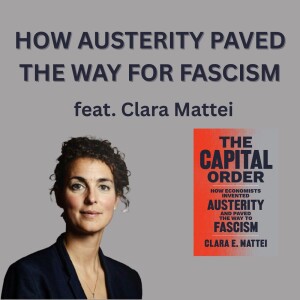
Tuesday Jun 24, 2025
Tuesday Jun 24, 2025
My guest Clara Mattei has written about austerity’s dark intellectual origins in her important new book The Capital Order: How Economists Invented Austerity and Paved the Way for Fascism. We discuss the main ideas of this book and how the historical roots of austerity emerge as a response by the ruling class to the social democratic gains of the working class following the First World War in Europe. At the core of Dr. Mattei's book is a powerful lesson for the left, namely that conditions of economic austerity have the tendency to sap the political resolve of the working class. Austerity depoliticizes the working class and this is why liberal economists implement it. We discuss the history of how economists and technocratic policymakers invented austerity and how we can challenge it.
Clara E. Mattei is a Professor of Economics and Director of the CHE, Center for Heterodox Economics, of The University of Tulsa Oklahoma, recently inaugurated in February 2025 (https://sites.utulsa.edu/chetu).
Please support my efforts by becoming a Patreon member https://www.patreon.com/c/emancipations
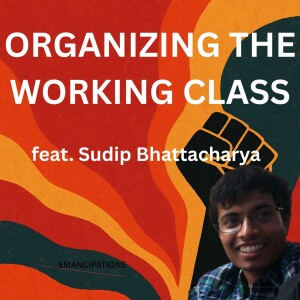
Tuesday Jun 24, 2025
Tuesday Jun 24, 2025
My guest Sudip Bhattacharya studies and organizes the working class in New Jersey and he joins me to discuss the findings of his work. We explore some practical strategies for organizing the working class, the future of socialist politics and ways to overcome some of the main limitations to class politics in our time.
This conversation is inspired by a new essay Sudip wrote for The Hampton Reader. Check out the book published with Iskra Press
Sudip Bhattacharya is a doctoral candidate in Political Science at Rutgers University. You can find his work at outlets like Protean magazine, Jacobin, Current Affairs, Black Agenda Report, among others.
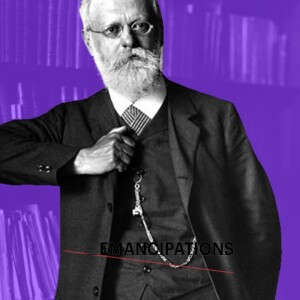
Wednesday Jun 11, 2025
Wednesday Jun 11, 2025
I am joined by Marxist historian Ian Szabo to discuss the revival of Karl Kautsky's revolutionary thought among contemporary Marxists. We discuss a recent article on Kautsky's theory of the dictatorship of the proletariat, and we address the predominant misreadings and misinterpretations that exist about Kautsky, and how his thought speaks to our present.
Read Ian Szabo's article "The Adolescence of a Concept: Dictatorship of the Proletariat in Karl Kautsky’s Revolutionary Writings (https://bit.ly/4hHoOaW).
Please support our efforts on Patreon https://www.patreon.com/c/emancipations
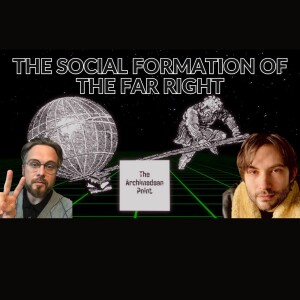
Tuesday Jun 10, 2025
Tuesday Jun 10, 2025
Welcome to The Archimedean Point, a new series on the current political situation from a Marxist perspective. In our second episode, Daniel Tutt and Conrad Hamilton discuss the inadequacies of left-liberal accounts of racism and bigotry and why only a Marxist analysis can address the ideology of the far right. We also discuss new work by Daniel on Michel Clouscard and his book Neo-Fascism and the Ideology of Desire and Conrad's new essay in the book After Speculative Realism.
Episode One of The Archimedean Point can be found here (https://youtu.be/kTjaIm0XmZU?si=5cHD0k4gjnMsMGPT)
The Archimedean Point is a reference to a concept from Lukács's History and Class Consciousness that refers to "the point from which the whole of reality can be overthrown."
SHOWNOTES:
The Social Formation of the Far Right https://bit.ly/3XSpR0B
Neo-Fascism and the Ideology of Desire https://bit.ly/41jfkfL
After Speculative Realism https://bit.ly/4ckRup4
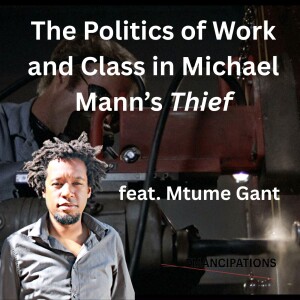
Monday Jun 09, 2025
Monday Jun 09, 2025
Welcome to a special crossover podcast discussion on Michael Mann's first major feature film Thief (1981). While Michael Mann is best known for films like HEAT and Last of the Mohicans, Thief is by far his most political film. The film explores themes of labor, exploitation, class and the inner lives of criminals and convicts. We discuss the Marxist and Freudian undertones in this great masterpiece of cinema.
This conversation is hosted by Mtume Gant, filmmaker, professor and host of Within Our Gates podcast and Daniel Tutt, philosopher and host of the Emancipations podcast.
Please support us at https://www.patreon.com/c/emancipations
Please support Within Our Gates at https://www.patreon.com/c/Tumes/home
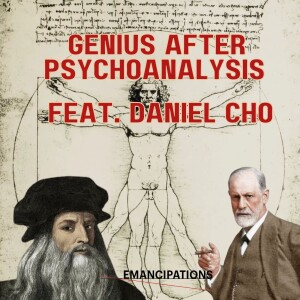
Saturday May 03, 2025
Saturday May 03, 2025
I am joined by K. Daniel Cho to discuss his provocative new book Genius After Psychoanalysis: Freud and Lacan which argues that genius is not exceptional talent or intelligence but is related to and illuminated by the psychological concept of sublimation. Beginning with a close examination of Freud's work on Leonardo da Vinci, Cho analyzes film, art, our relationship to nature, politics, group psychology, love, and philosophy to demonstrate that genius, far from an elitist notion, is universally available through a different approach to ideas of imperfection, disappointment, and failure. Learn more about the book.
K. Daniel Cho is Professor of Education at Otterbein University in Columbus, USA. He works on psychoanalysis in a variety of disciplinary contexts. He is the author of Psychopedagogy: Freud, Lacan, and the Psychoanalytic Theory of Education and coeditor of Marcuse’s Challenge to Education.
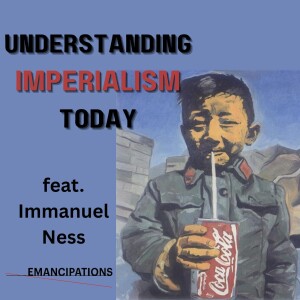
Saturday May 03, 2025
Saturday May 03, 2025
My guest is Dr. Immanuel Ness, one of the foremost scholars of contemporary imperialism, workers’ social organization, Global South political economy, socialism and migration. We discuss the concept of economic imperialism in today's time and how the theory of imperialism has changed since the time of Lenin. We also discuss the theory of the labor aristocracy in Marxist thought, whether China is truly a socialist country and the status of working class struggles in China compared to America.
Immanuel Ness is an American academic, and Professor of Political Science at the City University of New York, Brooklyn, School of Humanities and Social Sciences. His academic focus is on workers' organization, migration, mobilization and politics. His latest book is entitled Migration as Economic Imperialism: How International Labour Mobility Undermines Economic Development in Poor Countries and is published with Polity Press. Learn more about our work and join our community at https://www.patreon.com/c/torsiongroups
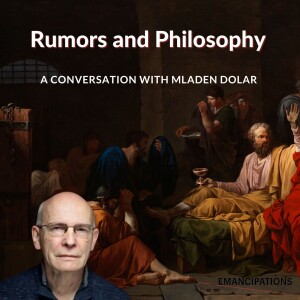
Monday Apr 07, 2025
Monday Apr 07, 2025
I am joined by the philosopher Mladen Dolar, one of the most important Lacanian philosophers working today. A founder of the Ljubljana school of psychoanalysis, Mladen Dolar has written important works on Hegel, Marx and numerous works on Lacanian thought. In this podcast, we discuss his experience studying with Lacan in Paris and the legacy of the 1960s on today's politics. We then turn to a discussion of Dolar's new book Rumors, a philosophical essay on the persistent problem of rumors from the time of Socrates to the present.
We examine how Socrates, Rousseau, Kafka and Kierkegaard each faced the problem of rumors and sought to overcome the stain of rumors on philosophy. Dolar writes that “rumors present another face of the big other, not the face of knowledge and truth but something that nobody quite believes to be true yet it unfailingly works and is given a questionable credence and general currency.” Learn more about Mladen Dolar's new book https://amzn.to/4b7WlJJ
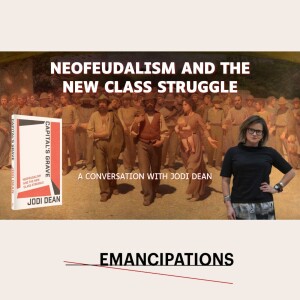
Tuesday Apr 01, 2025
Tuesday Apr 01, 2025
I am joined by political theorist Jodi Dean to discuss her provocative new book Capital's Grave: Neofeudalism and the New Class Struggle. Jodi Dean is one of the most vocal proponents of the "neofeudal thesis", the idea that capitalism has regressed to a neofeudal arrangement characterized by the delinking of capitalist accumulation from production, the end of competition, rent-seeking, predation and plunder. No longer can Marxists rely on a developmentalist theory of capitalism and a proletariat tied to productive labor as the means to abolishing capitalism. Dean argues that we must completely re-think the proletariat and that the global service sector points the way to a renewal of working class agitaiton and revolutionary activity.
Jodi Dean is a political theorist and professor in the Political Science department at Hobart and William Smith Colleges in New York state. Her books include The Communist Horizon, Crowds and Party, Comrade: An Essay on Political Belonging , Blog Theory and several others. Please check out Capital's Grave and order a copy here.
Join our Patreon to gain access to our interviews before they go live to the public and become a member of our study group collective where we read important books in Marxist thought and philosophy https://www.patreon.com/c/torsiongroups
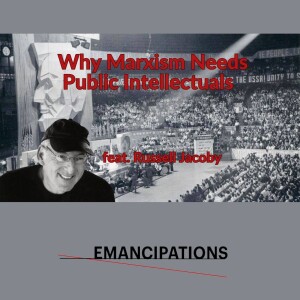
Tuesday Apr 01, 2025
Tuesday Apr 01, 2025
My guest Russell Jacoby is credited with coining the concept "public intellectual." He has written extensively on socialism in America, western Marxism and Freudian Marxism. We begin with a discussion of his criticism of Domenico Losurdo's recently translated work Western Marxism, we then discuss his recent Jacobin article "American Marxism Got Lost on Campus", the work of Christopher Lasch (Jacoby's Ph.D. advisor) and how Marxism can become "plain" again. Jacoby offers advice for Marxist scholars and writer to better reach the public and transcend academic specialization.
Russell Jacoby is the author of seven books including The Last Intellectuals: American Culture in the Age of Academe, Dogmatic Wisdom: How the Culture Wars Divert Education and Distract America and Dialectic of Defeat: Contours of Western Marxism. He is Emeritus professor of History at UCLA.
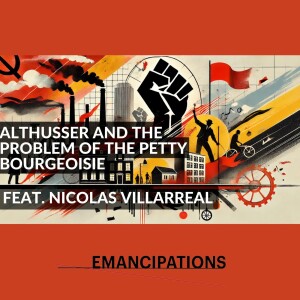
Tuesday Apr 01, 2025
Tuesday Apr 01, 2025
We welcome socialist thinker and writer Nicolas D. Villarreal for a discussion on the thought of Louis Althusser, and how to navigate the political and ideological problems of the petty bourgeoisie. We begin with a discussion into whether professionals qualify as a class and what their precise function is for the perpetuation of the bourgeois state. Villarreal takes the view that professionals do not constitute a class but that they rather play an ideological function. This conversation clarifies many outstanding debates on today's left around how to understand the PMC, the working class, the function of the state, and how the state controls and represses the citizenry.
Nicolas D. Villarreal is the founder of the CASPER Forum, Palladium Magazine contributor, a contributor to Cosmonaut Magazine and he is the author of the novel “Caeruleus”, two time winner of the Howard Scammon Drama Prize. He is a graduate of the College of William and Mary specializing in Government and Economics. Subscribe to Nicolas' Substack A Pre-History of an Encounter at (https://nicolasdvillarreal.substack.com).
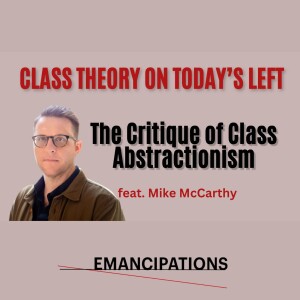
Tuesday Apr 01, 2025
Tuesday Apr 01, 2025
My guest Michael A. McCarthy joins me to discuss his critique of "class abstractionism" or the tendency to theorize the working class in ways that result in vulgar and reductive conclusions. While McCarthy directs his critique to Vivek Chibber and his work The Class Matrix, we also discuss class abstractionism more broadly and how it appears on today's left. We speculate on ways to better theorize class while remaining critical of left-liberal identity politics. McCarthy, along with co-author Mathieu Hikaru Desan published their critique of class abstractionism in Sociological Theory, “The Problem of Class Abstractionism" in 2023. McCarthy is a critical sociologist and his work is on class structure and class formation. He explores the past and possible futures of radical economic democracy. McCarthy is faculty at the University of California, Santa Cruz and he is the author, most recently of The Master’s Tools published January 2025 with Verso Books. Learn more about the book here.

